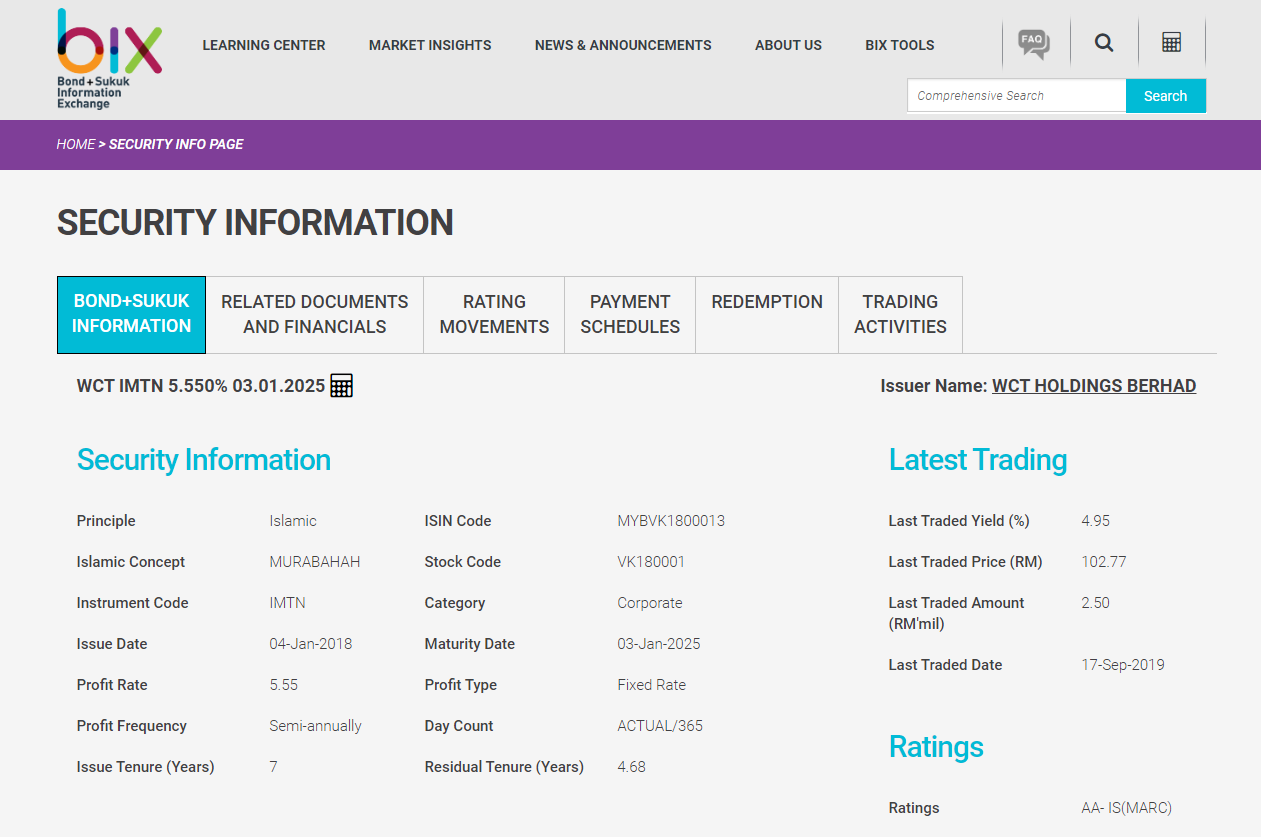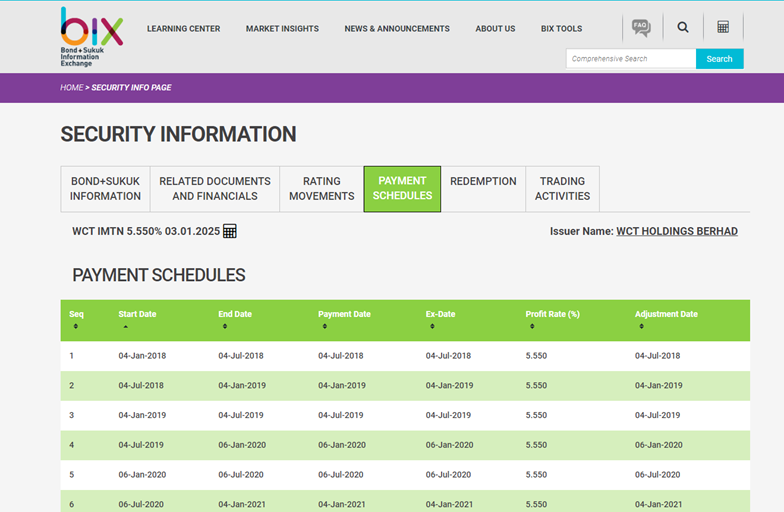
BIX ARTICLE
Why Retail Investors Should Consider Investing in Retail Bond/Sukuk?
May 27, 2020
|
7 min read
Featured Posts
Social Bonds Illustrative Use-Of-Proceeds Case Studies Coronavirus
Jul 06, 2020
|
2 min read
Sustainable Banking Network (SBN) Creating Green Bond Markets
Jul 06, 2020
|
2 min read
Why is Inflation Making a Big Comeback After Being Absent for Decades in the U.S.?
Mar 24, 2022
|
7 min read
SC issues Corporate Governance Strategic Priorities 2021-2023
Mar 29, 2022
|
3 min read
.png)
Bond is a fixed-income security which investors loan money to a corporation or government (the issuer), and investors are entitled to receive coupon payments from the issuer as a return. Sukuk is an Islamic bond which instead of receiving interest payments, sukuk investors will receive profit rates derived from underlying assets of the Sukuk. Investors can hold the bond/sukuk until its maturity date to receive back a principal on the face value invested, or they can sell the bond/sukuk in the secondary market before maturity.
Retail bond/sukuk refers to bond/sukuk specifically issued to investors who are not in a category of high-net-worth or sophisticated investors. This type of investor is known as a retail investor. Retail bond/sukuk is relatively new in Malaysia’s capital market. It was first introduced in 2015 when the Securities Commission Malaysia (SC) developed the framework for retail bonds and sukuk to facilitate greater retail participation in the bonds and sukuk market. Then in 2018, the SC liberalized regulatory framework for retail investment in Malaysia’s corporate bond and sukuk market.
(Learn more bond and sukuk glossary)
Why retail investors should consider investing in retail bond/sukuk?
Below are five reasons why retail investors should consider investing in retail bond/sukuk.
Minimum Amount to Invest in Retail Bond is RM 1,000
Retail investors in Malaysia can start investing in bond/sukuk from as low as RM 1,000. This bond/sukuk is known as seasoned bond/sukuk, and it can be purchased from eligible distributors as approved by the Securities Commission Malaysia (SC).
Before retail bond/sukuk was introduced, bond/sukuk market was accessible only to institutional and sophisticated investors as the minimum amount accepted for investment is RM 250,000. Besides the high investment amount, retail investors also had limited information about the bond/sukuk market as it was not publicly available.
With the liberalization of the regulatory framework for retail investment, retail investors now can invest in bond/sukuk at a lower investment amount. Furthermore, retail investors also have free access to bond/sukuk market information via BIX Malaysia, a centralized information platform for Malaysia’s bond and sukuk market. BIX Malaysia also provides a learning centre for retail investors to learn the fundamental knowledge of investing in bond/sukuk.
Fixed Income Stream every Six Months
One of the ways retail investors earn profit from investing in bond/sukuk is from a periodic fixed income payment known as a coupon for bond, and a profit rate for sukuk. Issuers have an obligation to pay this coupon/profit rate to investors in a timely manner. Otherwise, they will be subject to default claim. For majority of bonds/sukuk, coupons/profit rates will be paid to investors semi-annually or every six months
When investors first purchase the bond/sukuk, they will know immediately the details on the coupon/profit rates payment that they will be receiving throughout the bond/sukuk tenure. They will also know the exact dates when the next coupon/profit rate payments will be paid. All the information about the coupon/profit rate payment amount and the payment schedules are available on BIX Malaysia.


For example, as shown in the image above, a sukuk issued by WCT Holdings Berhad will pay investors a 5.55% profit rate per annum. This means investors will receive RM 27.75 semi-annually for every RM 1,000 face value of the sukuk. The payment schedules of this sukuk show that investors will receive the profit rate payment semi-annually in January and July every year.
Guaranteed Principal at Maturity
If investors decide to keep the bond/sukuk until maturity, the issuer will repay the principal or face value to the investors on the maturity date. For example, if the bond/sukuk has a face value of RM 1,000, investors will receive RM 1,000 on the maturity date. Just like the coupon/profit rate payment, the principal payment is guaranteed as issuers are obligated by law to repay it at maturity. Otherwise, they will subject to default and may result in a lawsuit by investors.
Alternatively, investors can choose not to keep the bond/sukuk until maturity, but instead, sell it to other investors in the secondary market. The price that he can get for the bond/sukuk will depend on the market interest rate at time of the sale transaction.
Higher Interest Rate/ Profit Rate than Fixed Deposits
Some retail bonds/sukuk offer a higher coupon rate or profit rate than a fixed deposit. Fixed deposit is a financial product by banks, where investors deposit some amount of money and keep it in the fixed deposit account for an agreed tenure ranging from 1-month up to five years. At the end of the tenure, investors will redeem the money they deposited plus the pre-determined interest rate.
Based on the recent article by the Ringgit Plus dated 14 April 2020, the top 6-month fixed deposit rates offered by banks in Malaysia range around 2.70% - 3.05%. The interest rate level of the fixed deposit is influenced by the Overnight Policy Rate (OPR) by Bank Negara Malaysia (BNM). In May 2020, Bank Negara Malaysia cut the OPR by 50 bps (0.50%) to 2.00% and there are possibilities of further rate cut in 2020 to mitigate the COVID-19 impact on the economy. Hence, the interest rate of fixed deposit is expected to be lower than 2% moving forward.
Bonds/sukuk give investors an option to invest in a fixed income instrument but at a higher interest or profit rate than the fixed deposit. For retail bonds/sukuk offered by the eligible distributor, the coupon rates/profit rates are between 3.1% - 5.0% annually. Furthermore, with the reduction of Overnight Policy Rate (OPR), the prices of bond/sukuk will increase as it moves inversely with OPR. The lower interest rate environment gives an edge to bond/sukuk with higher return of investment.
Nevertheless, investors should be aware that, the higher the interest/profit rate, the higher the risk of the investment. In this case, investing in bonds/sukuk carry a higher risk than investing in fixed deposits. Even so, in general, bond/sukuk risk is still lower compared to other investments such as stock. Therefore, in choosing between bonds/sukuk or fixed deposits for investment, investors might need to assess on which level of risks they can accept for their investments. One should also consider the credit rating of the bond in assessing the risks of the bond.
Lower Risk than Stocks
Bonds/sukuk have a lower risk than stocks. The fixed income returns from investing in bonds/sukuk is certain unless the bond/sukuk default. Investors gain profit from the fixed coupon/profit payment semi-annually, which is predictable. They are also able to recover their initial investment at face value of the bond if held until maturity. Both of these payments are guaranteed as the issuer is obligated to pay them.
On the other hand, the profit gained from the stock investment depends on its value in the market, which can be volatile for some stocks. In the worst-case scenario, investors might lose all of their initial investment when the stock price plunges below the value of their initial investment. Dividend payment from the stock can be uncertain too, as it depends on the company’s profit and board of director’s discretion whether to pay out dividend to investors or not.
Since bonds/sukuk have a lower risk than stocks and its investment income is certain, it is suitable for risk-averse investors.
References
Securities Commission Malaysia 2018, SC Liberalises Framework for Retail Investment in Malaysia’s Corporate Bond, and Sukuk Market
https://www.sc.com.my/resources/media-releases-and-announcements/sc-liberalises-framework-for-retail-investment-in-malaysias-corporate-bond-and-sukuk-market
iMoney Learning Centre 2019, Everything You Need to Know About Fixed Deposits in Malaysia
https://www.imoney.my/articles/what-is-fixed-deposit-how-do-fixed-deposits-work
RinggitPlus 2020, Best Fixed Deposit Accounts in Malaysia
https://ringgitplus.com/en/blog/fixed-deposits/best-fixed-deposit-accounts-in-malaysia.html
Disclaimer
This report has been prepared and issued by Bond and Sukuk Information Platform Sdn Bhd (“the Company”). The information provided in this report is of a general nature and has been prepared for information purposes only. It is not intended to constitute research or as advice for any investor. The information in this report is not and should not be construed or considered as an offer, recommendation or solicitation for investments. Investors are advised to make their own independent evaluation of the information contained in this report, consider their own individual investment objectives, financial situation and particular needs and should seek appropriate personalised financial advice from a qualified professional to suit individual circumstances and risk profile.
The information contained in this report is prepared from data believed to be correct and reliable at the time of issuance of this report. While every effort is made to ensure the information is up-to-date and correct, the Company does not make any guarantee, representation or warranty, express or implied, as to the adequacy, accuracy, completeness, reliability or fairness of any such information contained in this report and accordingly, neither the Company nor any of its affiliates nor its related persons shall not be liable in any manner whatsoever for any consequences (including but not limited to any direct, indirect or consequential losses, loss of profits and damages) of any reliance thereon or usage thereof.
YOU MAY ALSO LIKE
ARTICLE
Feb 04, 2026
|
4 min read
ARTICLE
Jan 30, 2026
|
6 min read
ARTICLE
Dec 01, 2025
|
4 min read
ARTICLE
Nov 04, 2025
|
4 min read


